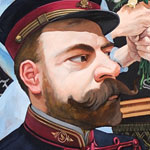
 (November 6, 1854 - March 6, 1932)
(November 6, 1854 - March 6, 1932)
Known throughout the world as the "March King," composer, conductor, and patriot John Philip Sousa is probably best known for the marches he composed. 1 In addition, he conducted many concerts; among them, Sousa conducted a concert in Toledo in 1909. According to a Toledo Blade review, "Sousa does all things well, but it was evident the encores, which were almost entirely his old-time airs, are still the ones that hold him dear to the people."2
In 1892, Sousa created the Sousa Band, which became extremely popular and toured internationally over more than twenty years. In fact, the Sousa Band performed at the 1904 World's Fair in St. Louis. 3 However, Sousa's impact did not solely reside in his work with his band. Naturally, the musical instrument referred to as the sousaphone was named after Sousa. 4 The sousaphone was first sold commercially in 1900. 5 Also, Sousa's compositions are well known. Some of his most famous marches are "Semper Fidelis" (1888), "Old Ironsides" (1926) and "The Stars and Stripes Forever" (1896), which sold more copies than any other composition for many years after it was first released on a record. 6 In fact, writer William Schuman has noted that "when one thinks of American music, he immediately comes to mind." 7 President Arthur requested Sousa to compose a march before Arthur left office, and he wrote the "Presidential Polonaise." 8 Sousa's marches sound patriotic, and this theme became a part of his occupation. At the age of twenty-five Sousa became the fourteenth leader of the U.S. Marine Band. 9 The Marine Band's recordings became the most popular recordings in America. 10
Sousa also worked in the theatre, composing fifteen operettas, including Katherine (1879), The Smugglers (1882), and El Capitan (1895). 11 Notably, the style of El Capitan was essentially the same as that of his individual march compositions. 12 Other influences on Sousa's compositions may be seen in musical theatre - most recognizable in The Black Crook and H.M.S. Pinafore. When the "March King" passed away in 1932, the U.S. Marine Band participated in three different memorial programs dedicated to the memory of John Philip Sousa. 13
1. Bierley, 21.
2. "Playing the Valentine."
3. Berger 47.
4. Bierley, 16.
5. Berger, 29.
6. Bierley, 19.
7. Schuman, 5.
8. Bierley, 47.
9. Bierley, 43.
10. Bierley, 51.
11. Bierley, 233.
12. Norton, 47.
13. Bierley, 94.
Resources
Berger, Kenneth. The March King and his Band: The Story of John Philip Sousa. New York: Exposition Press, 1957.
A good biography of Sousa, with a lengthy appendix listing all of Sousa's compositions.
Bierley, Paul E. John Philip Sousa, American Phenomenon. Rev. ed. Westerville, OH: Integrity Press, 1973.
This is a thorough biography of Sousa and his impact on music and American culture, especially marching bands.
"John Philip Sousa." America's Story. http://www.americaslibrary.gov/aa/sousa/aa_sousa_subj_e.html 11 October 2007.
Norton, Pauline. "Nineteenth Century American March Music and John Philip Sousa." Perspectives on John Philip Sousa. Newsom, Jon ed. Washington: Library of Congress, 1983.
An article that analyzes Sousa's impact on American march music, as well as what impacted his work on marches.
"Playing the Valentine: Some Big Names from the Past Plied These Boards." The Toledo Blade 10 October 2007 http://nl.newsbank.com/nl-search/we/Archives?p_action=doc&p_docid=0EAF3C7709930CA2&p_docnum=2&s_accountid=AC0107100919521111775&s_orderid=NB0107100919493518682&s_dlid=DL0107100919522911807&s_ecproduct=SBK-W3&s_subterm=Subscription%20until%3A%2010%2F16%2F2007%203%3A52%20PM&s_docsbal=Docs%20remaining%3A%202&s_subexpires=10%2F16%2F2007%203%3A52%20PM&s_docstart=3&s_docsleft=2&s_docsread=1&s_username=auburngrl&s_accountid=AC0107100919521111775&s_upgradeable=no.
This article mentions the year that Sousa performed in Toledo, as well as many other notable stars who also performed in Toledo throughout the years.
Schuman, William. "Semper Fidelis." Perspectives on John Philip Sousa. Ed. Jon Newsom. Washington: Library of Congress, 1983.
Another article on Sousa's marches, though this one looks more closely at what is thought of as sounding "American."
"Sousa, John Philip."